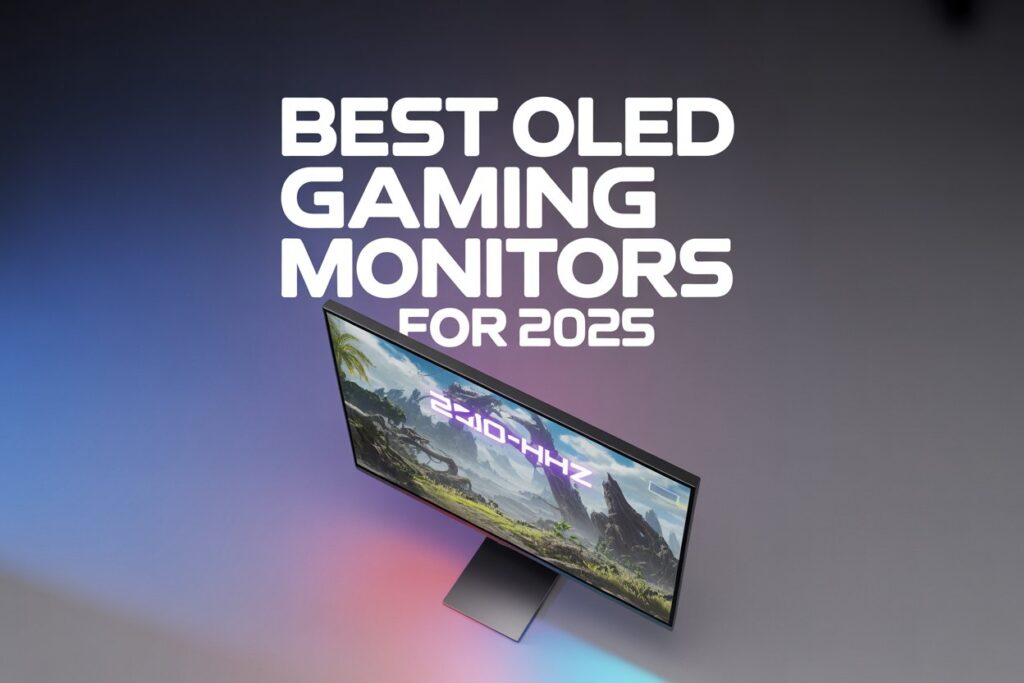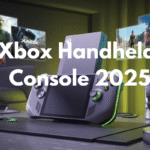📌 Quick Product List for Speed Readers
Here’s a snapshot of top OLED gaming monitors for 2025, each a 240Hz gaming monitor or better, designed for vibrant visuals and blazing speed.
| Monitor | Size | Resolution | Refresh Rate | Panel Type |
|---|---|---|---|---|
| ASUS ROG Swift OLED PG32UCDM | 32″ | 4K (3840×2160) | 240Hz | QD-OLED |
| LG UltraGear 32GS95UE-B | 32″ | 4K (3840×2160) | 240Hz/480Hz | WOLED |
| Alienware AW3225QF | 32″ | 4K (3840×2160) | 240Hz | QD-OLED |
| MSI MPG 271QRX QD-OLED | 27″ | 1440p (2560×1440) | 360Hz | QD-OLED |
| Samsung Odyssey OLED G80SD | 32″ | 4K (3840×2160) | 240Hz | QD-OLED |
| Gigabyte AORUS FO27Q3 | 27″ | 1440p (2560×1440) | 360Hz | QD-OLED |
| HP Omen Transcend 32 OLED | 32″ | 4K (3840×2160) | 240Hz | QD-OLED |
Contents
- 1 What Makes OLED Monitors a Game-Changer?
- 2 Why 240Hz OLED Gaming Monitors Are the New Standard
- 3 Top OLED Gaming Monitors in 2025 (Full Reviews)
- 3.0.1 1. ASUS ROG Swift OLED PG32UCDM
- 3.0.2 2. LG UltraGear 32GS95UE-B
- 3.0.3 3. Alienware AW3225QF
- 3.0.4 4. MSI MPG 271QRX QD-OLED
- 3.0.5 5. Samsung Odyssey OLED G80SD
- 3.0.6 6. Gigabyte AORUS FO27Q3
- 3.0.7 7. HP Omen Transcend 32 OLED
- 3.0.8 Comparison Table: 4K OLED Gaming Monitors
- 3.0.9 Comparison Table: 1440p OLED Gaming Monitors
- 4 Things to Consider Before You Buy
- 5 FAQs
- 6 Final Thoughts + Call to Action
What Makes OLED Monitors a Game-Changer?
An OLED gaming monitor redefines what a display can do. Unlike LCDs, it uses organic light-emitting diodes, with each pixel emitting its own light. This delivers true blacks, infinite contrast, and colors that pop. In 2025, these screens are a gamer’s dream, especially with 240Hz gaming monitor speeds.
- Deep Contrast: No backlight means pure darkness, outshining IPS or VA panels.
- Instant Response: At 0.03ms, it eliminates ghosting for crisp visuals.
- Vivid Colors: Covering 99%+ DCI-P3, games feel alive.
- Wide Angles: Colors stay true from any angle, great for multiplayer sessions.
Here’s how it stacks up:
| Feature | OLED Gaming Monitor | IPS | VA |
|---|---|---|---|
| Contrast | Infinite, true blacks | Good, some bleed | High, but not OLED |
| Response Time | 0.03ms, no ghosting | 1–4ms, some ghosting | 2–5ms, ghosting |
| Color Gamut | 99%+ DCI-P3, vibrant | Accurate, less vivid | Good, black crush |
| Refresh Rate | Up to 480Hz (240Hz gaming monitor) | Up to 360Hz | Up to 240Hz |
Picture Riley, a casual gamer hooked on Fortnite. His old IPS monitor blurred fast builds, costing him wins. Switching to an OLED gaming monitor changed everything—sharp visuals, vibrant colors, and smooth gameplay. He’s now topping leaderboards, and his squad’s jealous. That’s the power of it.
Quick Note: Get an OLED gaming monitor, and your dog might start watching your kills. Woof, nice shot!
It’s not just a screen—it’s a portal to epic gaming with 240Hz gaming monitor performance.
Why 240Hz OLED Gaming Monitors Are the New Standard
Refresh rate is the heartbeat of gaming, and a 240Hz gaming monitor is the 2025 benchmark. It refreshes 240 times per second, keeping up with fast-paced titles like Valorant or Call of Duty. Paired with an OLED gaming monitor, you get fluid visuals with no blur. It’s a big deal.
Higher refresh rates cut motion blur and input lag, making a 240Hz gaming monitor ideal for competitive play. Every flick shot feels instant. Casual gamers love the smoother panning, too. It ensures zero ghosting with pixel-perfect response. Miss a shot? Not anymore.
Quick Note:
240Hz vs. 144Hz
- 240Hz Gaming Monitor: Smoother, less blur, esports-ready.
- 144Hz: Decent, but lags in fast games.
- OLED Edge: Perfect blacks, no smearing, total immersion.
Some models, like the LG UltraGear 32GS95UE-B, hit 480Hz at lower resolutions for insane speed. For most, a 240Hz gaming monitor is enough to dominate. Want the edge? Get it with 240Hz.
For competitive gamers, 240Hz means reacting faster than opponents. In Overwatch 2, a split-second dodge can win a match. Casual players benefit, too—exploring Elden Ring feels smoother, with every frame rendered beautifully. It’s about precision and immersion, whether you’re a pro or just chilling.
Top OLED Gaming Monitors in 2025 (Full Reviews)
Below are seven top displays for 2025, each a 240Hz gaming monitor or faster. We’ve picked a mix of 4K and 1440p models for different budgets, playstyles, and setups, with no brand bias. Each review dives into features, use cases, and why it shines.
1. ASUS ROG Swift OLED PG32UCDM
- Size & Resolution: 32″, 4K (3840×2160)
- Refresh Rate: 240Hz (480Hz at 1080p)
- Key Features: QD-OLED panel, 99% DCI-P3, G-Sync/FreeSync, HDR10, DisplayPort 2.1, USB-C (90W PD), burn-in protection (pixel shift, logo dimming).

- Pros:
- Stunning 4K visuals for RPGs like Baldur’s Gate 3
- 1000 nits peak brightness for vibrant HDR
- Dual-mode (4K 240Hz or 1080p 480Hz) for versatility
- Robust ports for multi-device setups
- Cons:
- Premium price may deter budget gamers
- Matte coating slightly softens contrast
- Price: ~$1300–$1500
- Link: ASUS ROG Swift PG32UCDM
This ASUS gaming monitor is a masterpiece. It delivers vibrant QD-OLED colors, perfect for cinematic games or esports. The dual-mode feature lets you switch between 4K immersion and 480Hz speed, ideal for Cyberpunk 2077 or Rocket League. It’s pricey, but a dream. Gamers, this is it.
2. LG UltraGear 32GS95UE-B
- Size & Resolution: 32″, 4K (3840×2160)
- Refresh Rate: 240Hz (480Hz at 1080p)
- Key Features: WOLED panel, 98.5% DCI-P3, FreeSync Premium Pro, G-Sync, HDR10, dual-mode resolution, 7W speakers, burn-in mitigation.

- Pros:
- Flexible dual-mode for 4K or 480Hz
- Deep blacks, high contrast for Starfield
- Surprisingly good audio
- Cons:
- HDR needs manual tweaks
- No DisplayPort 2.1
- Price: ~$1100–$1400
- Link: LG UltraGear 32GS95UE-B
It switches between 4K immersion and 480Hz speed, perfect for Apex Legends or The Witcher. A 240Hz gaming monitor that balances performance and value. LG nails versatility. Great pick.
3. Alienware AW3225QF
- Size & Resolution: 32″, 4K (3840×2160)
- Refresh Rate: 240Hz
- Key Features: QD-OLED, 99.3% DCI-P3, G-Sync/FreeSync, Dolby Vision, HDMI 2.1, 3-year burn-in warranty.
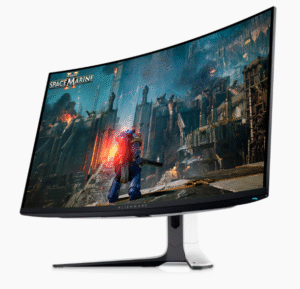
- Pros:
- Gorgeous 4K visuals for God of War
- Best value (~$900–$1100)
- Console-friendly HDMI 2.1 for PS5
- Cons:
- SDR brightness (250 nits) is dim
- No dual-mode resolution
- Price: ~$900–$1100
- Link: Alienware AW3225QF
It rivals any ASUS gaming monitor. A budget-friendly pick with vibrant colors, ideal for consoles or PCs. It’s a steal for 4K gaming. Value meets quality.
4. MSI MPG 271QRX QD-OLED
- Size & Resolution: 27″, 1440p (2560×1440)
- Refresh Rate: 360Hz
- Key Features: QD-OLED, 99% DCI-P3, FreeSync/G-Sync, HDR400, advanced burn-in protection, USB-C (96W PD).
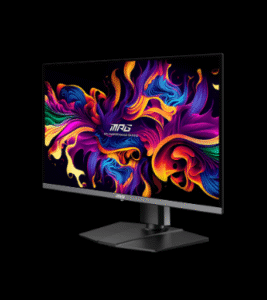
- Pros:
- Blazing 360Hz for Counter-Strike 2
- Affordable (~$600–$800)
- Vibrant colors for esports
- Cons:
- Not 4K, less immersive for RPGs
- Text clarity slightly soft
- Price: ~$600–$800
- Link: MSI MPG 271QRX
This 240Hz gaming monitor (actually 360Hz) is an esports beast. It’s wallet-friendly and perfect for twitch shooters. Speed is king. Esports? Sorted.
5. Samsung Odyssey OLED G80SD
- Size & Resolution: 32″, 4K (3840×2160)
- Refresh Rate: 240Hz
- Key Features: QD-OLED, 99% DCI-P3, FreeSync, HDR400, HDMI 2.1, burn-in protection, sleek design.
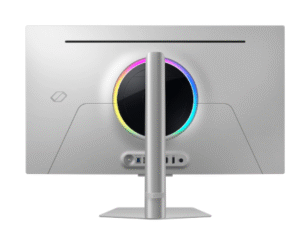
- Pros:
- Cinematic QD-OLED colors for Elden Ring
- Slim, modern aesthetic
- Console-friendly for Xbox
- Cons:
- No official G-Sync
- Limited port selection
- Price: ~$1000–$1300
- Link: Samsung Odyssey G80SD
It’s a visual stunner. A 240Hz gaming monitor for cinematic RPGs. Sleek and immersive, Samsung delivers a premium look. Love it.
6. Gigabyte AORUS FO27Q3
- Size & Resolution: 27″, 1440p (2560×1440)
- Refresh Rate: 360Hz
- Key Features: QD-OLED, 99% DCI-P3, FreeSync/G-Sync, HDR400, USB-C, burn-in protection.
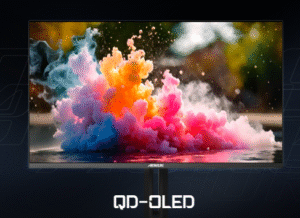
- Pros:
- Ultra-fast 360Hz for Valorant
- Affordable (~$600–$800)
- Solid color accuracy
- Cons:
- No 4K, less detail for story games
- Basic stand adjustments
- Price: ~$600–$800
- Link: Gigabyte AORUS FO27Q3
It pushes past typical 240Hz gaming monitor performance with 360Hz. Budget esports fans, this is it. Fast, affordable, and sharp.
7. HP Omen Transcend 32 OLED
- Size & Resolution: 32″, 4K (3840×2160)
- Refresh Rate: 240Hz
- Key Features: QD-OLED, 99% DCI-P3, G-Sync/FreeSync, HDR10, Thunderbolt 4 (96W PD), burn-in protection.
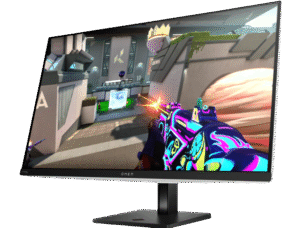
- Pros:
- Great for gaming and creative work
- Premium connectivity with Thunderbolt
- Accurate colors for Horizon
- Cons:
- High price (~$1200–$1500)
- No dual-mode resolution
- Price: ~$1200–$1500
- Link: HP Omen Transcend 32
This ASUS gaming monitor rival is a work-play hybrid. It excels in gaming and editing. Pricey, but versatile. Work hard, game harder.
Comparison Table: 4K OLED Gaming Monitors
| Monitor | Resolution | Refresh Rate | Price | Standout Feature |
|---|---|---|---|---|
| ASUS ROG Swift PG32UCDM | 4K | 240Hz/480Hz | $1300–$1500 | Dual-mode resolution |
| LG UltraGear 32GS95UE-B | 4K | 240Hz/480Hz | $1100–$1400 | Built-in speakers |
| Alienware AW3225QF | 4K | 240Hz | $900–$1100 | HDMI 2.1 for consoles |
| Samsung Odyssey G80SD | 4K | 240Hz | $1000–$1300 | Sleek design |
| HP Omen Transcend 32 | 4K | 240Hz | $1200–$1500 | Thunderbolt 4 |
Comparison Table: 1440p OLED Gaming Monitors
| Monitor | Resolution | Refresh Rate | Price | Standout Feature |
|---|---|---|---|---|
| MSI MPG 271QRX QD-OLED | 1440p | 360Hz | $600–$800 | Budget-friendly |
| Gigabyte AORUS FO27Q3 | 1440p | 360Hz | $600–$800 | Great color accuracy |
These displays fit every gamer—4K for visuals, 1440p for speed. Pick your vibe.
Things to Consider Before You Buy
Choosing an OLED gaming monitor is exciting, but don’t rush. Here’s how to ensure your 240Hz gaming monitor fits your needs and setup.
- Desk Space: A 32″ model like the ASUS ROG Swift PG32UCDM needs a wide desk—measure first. A 27″ like the MSI MPG 271QRX saves space. Don’t cram it in. A cluttered desk kills the vibe.
- Burn-In Myths: Burn-in fears are overblown in 2025. It uses pixel shift, logo dimming, and screen savers to stay safe. Play varied games, switch between Apex and Stardew Valley, and you’re fine. No stress.
- HDR Performance: HDR10 or Dolby Vision makes colors pop. The Alienware AW3225QF’s Dolby Vision is a standout. Your eyes will thank you. HDR is a game-changer for cinematic titles.
- Build Quality: A sturdy stand and modern ports matter. The HP Omen Transcend 32’s Thunderbolt 4 is a creator’s dream, doubling as a hub for laptops or peripherals. Build quality lasts.
- Gaming Preferences: FPS players need a 240Hz gaming monitor or faster (MSI’s 360Hz for Valorant). RPG fans? 4K models like the Samsung Odyssey G80SD shine for Elden Ring’s vast landscapes. Match your monitor to your games.
- Budget Planning: Prices range from $600 (MSI) to $1500 (ASUS). Set a budget, but invest in quality. A cheap monitor can cost you in performance. Value matters.
- GPU Compatibility: A 240Hz gaming monitor needs a strong GPU (e.g., RTX 4080 or AMD RX 7900 XTX) for 4K at high frame rates. Check your rig before buying it. A weak GPU bottlenecks performance.
- Playstyle Fit: Competitive gamers benefit from 360Hz or 480Hz for twitch reflexes in Overwatch 2. Story-driven players prioritize 4K for detail in Horizon Forbidden West. Know your playstyle to pick the right display.
- Setup Considerations: Think about cable management, monitor arms, and desk depth. A 32″ monitor looks epic but needs space. A VESA mount can free up room. Plan your setup for comfort.
An ASUS gaming monitor or similar is a big step. Choose smart, game hard. That’s what you want, right?
FAQs
Got questions about these displays? Here’s the scoop.
1. Is an OLED gaming monitor worth it for casual players?
Totally. A 240Hz gaming monitor like the LG UltraGear 32GS95UE-B makes The Sims or God of War look unreal. Casual gaming deserves epic visuals, too.2. Can you get 240Hz on an OLED gaming monitor without screen tearing?
Yes. G-Sync and FreeSync, standard in it, like the ASUS ROG Swift PG32UCDM, stop tearing. Smooth gameplay, guaranteed. No hiccups.3. What’s the best refresh rate for esports gamers?
A 240Hz gaming monitor is solid, but 360Hz (MSI MPG 271QRX) or 480Hz (LG UltraGear) gives an edge. Pair with a top GPU. Win more.4. Are OLED gaming monitors good for productivity too?
Absolutely. The HP Omen Transcend 32’s 4K display is a work-play hybrid. Game at night, edit photos or videos by day. It’s a beast for multitasking.
Final Thoughts + Call to Action
In 2025, an OLED gaming monitor is the ultimate gaming upgrade. With perfect blacks, vibrant colors, and instant response, a 240Hz gaming monitor like the ASUS ROG Swift PG32UCDM or Alienware AW3225QF redefines immersion. From budget 1440p to premium 4K, it caters to every gamer. Whether you’re chasing esports glory or diving into cinematic worlds, it delivers the goods.
Which display is your favorite? Drop it in the comments! Save this guide for your next upgrade and join ToolsNexus. We drop daily tech tips, reviews, and buyer’s guides to keep your setup epic. Grab your OLED gaming monitor and game on!
Read Next About:
Top Wireless Microphones for Crystal Clear Audio in 2025 (Bluetooth Picks Included)


